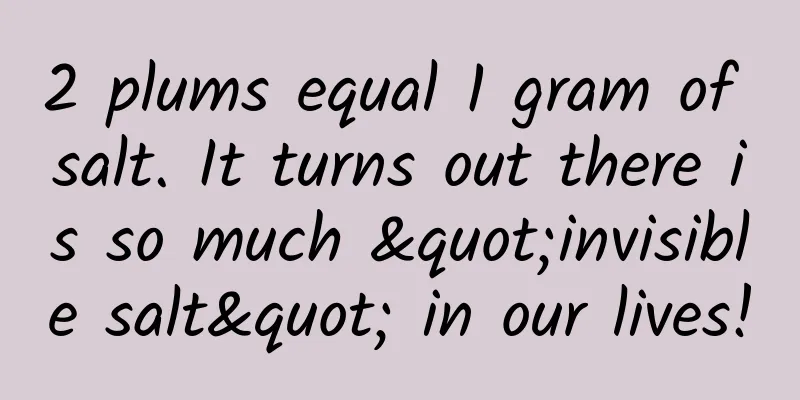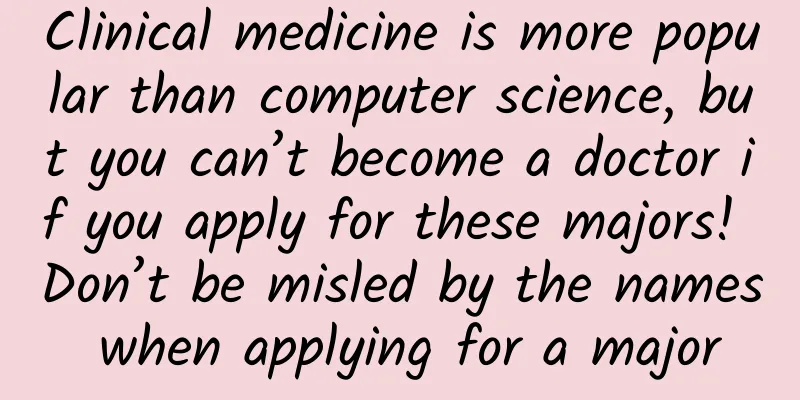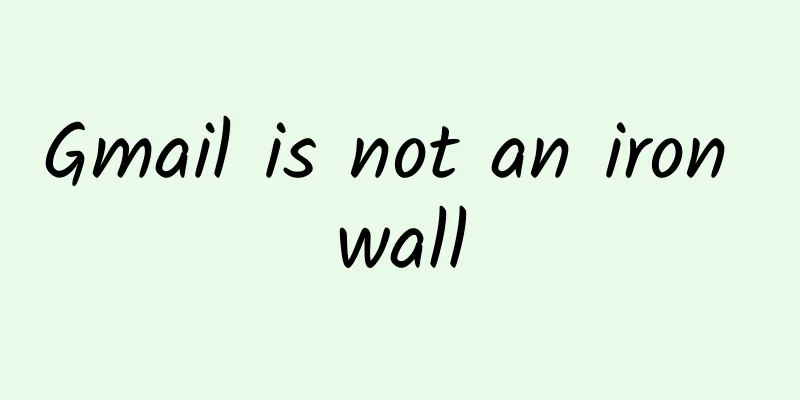2 plums equal 1 gram of salt. It turns out there is so much "invisible salt" in our lives!

|
Audit expert: Wang Guoyi Postdoctoral fellow in Nutrition and Food Safety, China Agricultural University The weather is hot and everyone becomes lazy. Not only does the body become lazy, but also the taste becomes lazy. The editor has a friend who is a big hotpot lover, but according to her, once summer comes, she becomes insulated from hotpot. In addition to various iced fruits and cool drinks on a daily basis, what she eats the most is candied fruits, which are sour and sweet and very appetizing. Source: pixabay Indeed, in the hot summer, some people are prone to loss of appetite. You can eat a small amount of candied plums to adjust your taste, but do you know that a lot of salt is added to candied plums. If you are not careful, you may exceed the salt intake limit. A few days ago, the "Dietary Guidelines for Chinese Residents (2022)" introduced the latest "salt" standard, recommending that people over the age of 11 should not consume more than 5g of salt per person per day, which is less than the "6g" salt amount in the old version of the guidelines. What does 5g of salt mean? Looking at the nutrition label on the outer packaging of a pack of snail noodles, every 100 grams contains 1.5 grams of sodium, which is equivalent to about 3.8 grams of table salt. Eating a pack of snail noodles (300 grams) is equivalent to consuming 11 grams of salt, which is far more than the recommended daily intake. If you eat other three meals with normal salt content, the salt intake will be seriously exceeded. Source丨Author Not salty ≠ less salt, the ubiquitous "invisible salt" Some people may say that they usually have a light taste and their salt intake must not be much. Is this really the case? Salt plays one of the most important roles in people's diet. Without salt, all delicious food will become tasteless. Many foods that we eat are not salty, but the salt content is not low. Their salty taste is often masked by other flavors, which "tricks" us into thinking that there is no salt in the food. The salt that we don't pay attention to or see is called "invisible salt." Source: pixabay Invisible salt is everywhere. It is often hidden in various pickled foods, seasonings, sauces, and snacks. If you look at the ingredient list on the outer packaging of sweet biscuits, you will find that salt is also present. There are also many sweet foods, such as cheese, bread, etc., that also have salt added during the production process. Source丨Author Sweet foods contain salt, not to mention salty foods such as instant noodles, sausages, etc. The hidden salt content should not be underestimated. Wang Yingyao, deputy secretary-general of the Chinese Nutrition Society, said: Half a small salted duck egg basically contains 1 gram of salt; one-third of a section of ham sausage also contains 1 gram of salt; two small plums contain 1 gram of salt; 1 spoonful of ordinary soy sauce generally contains 1 gram of salt. Source | Screenshot of CCTV Finance video What happens if you eat too much salt? The dietary guidelines recommend the daily salt intake of the human body, so why can't we eat too much salt? Because excessive salt intake, especially excessive intake of "invisible salt", can cause a lot of harm to the body without knowing it. Salt & Stomach From the moment we take our first bite of delicious food, invisible salt enters the stomach through the mouth and esophagus. The main component of table salt is sodium chloride. Excessive sodium ions will stimulate the gastric mucosa, cause proliferation of gastric epithelial cells, and further promote the risk of atrophic gastritis. Atrophic gastritis is an important factor in causing gastric adenocarcinoma. Secondly, sodium ions also promote the growth of Helicobacter pylori, the enemy of the stomach and intestines. In the long run, it is easy to cause chronic inflammation and gastric ulcers. Salt & Blood After being digested by the stomach, sodium ions enter the human blood vessels and participate in the blood circulation throughout the body. Excessive sodium ions will cause the sodium ion concentration in the blood vessels to increase, causing vasoconstriction and promoting blood pressure to rise. In the long run, it will increase the risk of cardiovascular and cerebrovascular diseases. Salt & Kidney Sodium ions reach the kidneys through blood circulation. Generally speaking, the kidneys can excrete salt that the human body does not need on their own. However, when the human body consumes too much salt, the kidneys cannot process it in time and excess sodium ions will be retained in the body. Source: pixabay Have female friends noticed that if they eat too much before going to bed every night, they are prone to edema the next day. This is also because excessive salt intake affects the normal function of the kidneys. Salt & Bone When you take your parents to the hospital for a physical examination, the doctor will often advise the elderly to eat a light diet and eat less salt. This is because excessive salt intake can easily induce osteoporosis. The process of our kidneys excreting sodium ions is also accompanied by the excretion of calcium. Excessive sodium intake will increase the excretion function of the kidneys, which will lead to an increase in calcium ion discharge, which will increase the risk of osteoporosis in the long run. How to avoid invisible salt? Salt has so many harmful effects, especially the "invisible salt" which can quietly damage our health. So, how can we avoid consuming too much invisible salt? First of all, in our daily lives, we should develop a good habit of "reading frequently". Pay more attention to the "Nutrition Information Table" on the outer packaging of food to see if there is sodium and sodium-containing food additives and their content. Common sodium-containing ingredients include sodium nitrite, sodium citrate, sodium benzoate, sodium polyphosphate, etc. In addition, in our daily diet, we should pay attention to the salt combination. If the staple food is noodles, wontons and other foods with high salt content, other foods should be less salty. There are also some hard-core ways to reduce salt, such as buying low-sodium salt, using a household salt reduction spoon to control the amount of salt, etc. Source: pixabay All in all, although salt is a necessary condiment for deliciousness, don’t be greedy. Be especially wary of “invisible salt” and use our carefulness and keen eyes to protect our bodies! |
>>: Will the parallel lines of sadness ever meet one day?
Recommend
WeChat payment mini program, how to connect the mini program to mobile payment?
Q: WeChat payment mini program, how does the mini...
How much does it cost to create a Baidu Encyclopedia entry for your company? Do you believe it’s free?
Whether you are an artist, actor, or industry exp...
The brain's computing speed is 9,000 times faster than a PC
According to foreign media reports, scientists at ...
Wentian Laboratory, what is it going to do in space?
Mixed Knowledge Specially designed to cure confus...
What is it like to update an old iPhone to iOS 10? We did an experiment
Tencent Technology News: In recent years, Apple s...
Is the birthday greeting video of an African child real? How to send birthday wishes to African children?
Videos of African children holding up signs and R...
Zhihu's "Seven-Day Unconditional Refund" disrupts knowledge payment: Come on, let's hurt each other
On that special train to April, to the springtime...
How to analyze data in product operations?
Today we will talk about the last element of the ...
Douyin Must-Hit Academy·Food Addiction-Group Buying Expert Practical Course, teach you how to become a group buying store explorer with zero basic knowledge
Douyin must-be-hot academy·Fan Shangyou-Group buy...
WeChat mini program bargaining software, how to make the WeChat mini program bargaining software?
WeChat mini program bargaining software, how to m...
Nezha of the people, created by the people! An open letter from Nezha Auto's Zhang Yong to users
On June 22, Nezha Auto held a "Creation"...
Model S loses crown in U.S. electric car sales ranking in October
In October, the sales of electric vehicles (inclu...
Apple makes an exception and allows employees to take unreleased prototypes home. The new iPhone is made entirely by remote control
During the COVID-19 pandemic, Apple made an excep...
Price inquiry for customized Altay glasses mini program. How much does customized Altay glasses mini program cost?
In order to better penetrate into various industr...
What languages can be used to develop mini programs? What programming language is used to develop mini programs?
On the iOS platform, the traditional programming ...









![Peking University Feng Ke: Learn supply chain finance and Internet finance from scratch [Insights]](/upload/images/67cc10dc26ffe.webp)